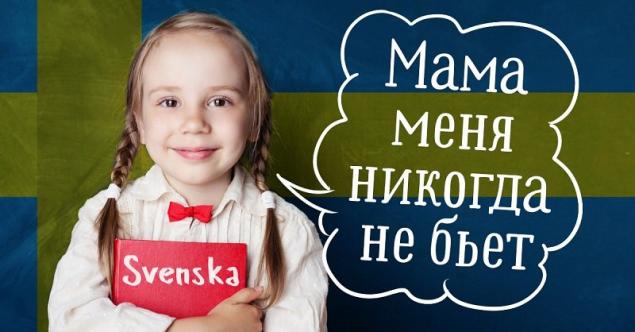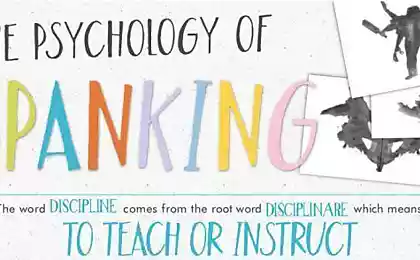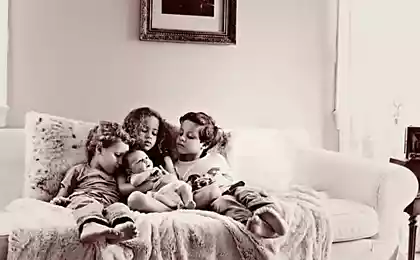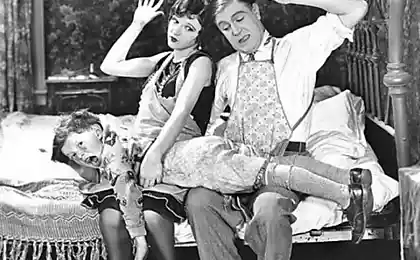298
Why you can't beat children
Surely each of us, if you think a little and look into his childhood, will be able to remember a pretty slap from his mother or a couple of slaps from his father. Whether it was good or bad, it’s hard to say now, but we grew up so much and considered it the norm. But the world has changed a lot since then, as has the approach to parenting.
If our standards of education change rather slowly, then European countries are developing at a rapid pace. For example, some 150 years ago it was common for Swedish parents to unfasten a child with rods, and also go to the library and read which rods are better for this business.

DepositPhotos
This is the first country where it is illegal to beat children. Today's edition. "Site" It will tell you how they got there and whether it works.
Is it possible to beat children in the 70s? corporal punishment Children were the norm, part of education. No one thought at the time that this might be wrong. Except for one woman who was the first to say that violence against children should not be the norm.

Everyone knows this woman, because everyone remembers and loves her fairy tales. Astrid Lindgren She is a famous and talented storyteller, as well as a person who changed the whole system of education and gave an opportunity for a whole generation to grow up without violence. In 1978 in Germany at the ceremony of awarding the “Peace Prize” she gave a speech that went around the world.
The aggression we see around us begins in our childhood. The first lesson of violence comes from our parents, who punish children with slaps and slaps and often with a belt. After that, the child begins to believe that violence can solve all problems.

Part of her speech was, “I don’t think so.” A child is not born good or bad. Who decides whether he will be an open and kind or a stale and fierce lone wolf? We, his parents, are the people who need to show the child what love is. Or, unwittingly, teach him the opposite.”

The speech was so sincere and poignant that it sparked a heated debate in Sweden and Germany over physical punishment. The citizens of these countries realized that this is not the way out, and since then their education system has completely changed. In 1979, Sweden officially banned corporal punishment of children at home and school.
Of course, it does not happen that a law was written, and then everyone immediately changed, saw and stopped beating children. No, it was much more complicated. The trick is that this law did not remain on paper, but began to work. To get the message across to every family, the government launched a massive information campaign.
It was a kind of propaganda, because they talked about change at every step. Every citizen was taught that it is impossible to beat children, that the new generation should not be like this, these children should believe in themselves, their rights and in their state. Such slogans were heard from TV screens, pronounced on the radio, and even on milk bags they could be seen.

DepositPhotos The state took care of the parents. A lot of literature, pamphlets and leaflets were produced that taught parents to raise a child without violence and humiliation. There was also a hotline to call and ask for advice.
By the way, it still exists today. There are hotlines for children and they can call at any time and ask for help if they are offended at home. This is something that Sweden immediately responds to.

DepositPhotos
The modern system of raising children in Sweden Now to such a situation of things used to all. A whole generation of people has already grown up on this law. The state provides all possible support to parents, everything is honed to automatism.
The lion’s share of education is taken over by preschool institutions. Everything there is built on clear rules, where violence is prohibited. Respect for the child comes first, and respect for others comes second. This is the principle on which children are raised in Sweden.
2947-1977
DepositPhotos
Since childhood, Swedes are taught simple rules: you can not fight, you need to respect others, wait your turn, be responsible for your choice. They are told about their rights, at the age of two the child knows everything about it. Saying “no” when you’re being abused is the first science children learn in Sweden.
The penalties for violence are also very strict. Due to one complaint, which will also be proven, the child can be taken from the family. If someone on the street sees that a parent used force on a child, they will immediately call the police. When corporal punishment occurs in the family all the time, the parents may even go to prison.

DepositPhotos That's just not at all like some evil dystopia. Children and parents are very happy, cases when a child is taken from the family, rather a rarity, not a mass phenomenon. Everyone is used to living like this, it has become the norm.
Sweden is a very child-loving country. They take care of the children as well as the parents. In every cafe and restaurant there will be a children's chair and some fun for the baby. All shopping centers and large shops are equipped so that the child can be fed and changed.

DepositPhotos
In the country, it is customary to go everywhere with children, but there is no detocentrism in society. Parents’ lives don’t revolve around children. Parents are not fanatical, they do not try to teach a child to read and speak three languages. Children in Sweden are not raised, they live with them.
There is no concept of any kind of maternal duty or children's debt to their parents. And motherhood is not considered a feat. Everything there is calm and quite adequate attitude. What they care about first and foremost is the safety of children, because that's really important.

DepositPhotos
Many may criticize this liberal parenting system, but it works. In Sweden, with the introduction of this law, the number of crimes has decreased. It is a truly happy nation. Perhaps it is because they have renounced violence once and for all.
About the pros and cons of such education can be said a lot, and opinions are always divided. For example, the Swedish psychiatrist and author of several books, David Eberhard, believes that liberal parenting harms both children and parents.
Each country has its own approach to raising children. We recently wrote about what Dutch mothers can learn and why their parenting system is one of the best.
Do you think it is possible to beat children? Are corporal punishments necessary in education? Tell us everything you think in the comments!
If our standards of education change rather slowly, then European countries are developing at a rapid pace. For example, some 150 years ago it was common for Swedish parents to unfasten a child with rods, and also go to the library and read which rods are better for this business.

DepositPhotos
This is the first country where it is illegal to beat children. Today's edition. "Site" It will tell you how they got there and whether it works.
Is it possible to beat children in the 70s? corporal punishment Children were the norm, part of education. No one thought at the time that this might be wrong. Except for one woman who was the first to say that violence against children should not be the norm.

Everyone knows this woman, because everyone remembers and loves her fairy tales. Astrid Lindgren She is a famous and talented storyteller, as well as a person who changed the whole system of education and gave an opportunity for a whole generation to grow up without violence. In 1978 in Germany at the ceremony of awarding the “Peace Prize” she gave a speech that went around the world.
The aggression we see around us begins in our childhood. The first lesson of violence comes from our parents, who punish children with slaps and slaps and often with a belt. After that, the child begins to believe that violence can solve all problems.

Part of her speech was, “I don’t think so.” A child is not born good or bad. Who decides whether he will be an open and kind or a stale and fierce lone wolf? We, his parents, are the people who need to show the child what love is. Or, unwittingly, teach him the opposite.”

The speech was so sincere and poignant that it sparked a heated debate in Sweden and Germany over physical punishment. The citizens of these countries realized that this is not the way out, and since then their education system has completely changed. In 1979, Sweden officially banned corporal punishment of children at home and school.
Of course, it does not happen that a law was written, and then everyone immediately changed, saw and stopped beating children. No, it was much more complicated. The trick is that this law did not remain on paper, but began to work. To get the message across to every family, the government launched a massive information campaign.
It was a kind of propaganda, because they talked about change at every step. Every citizen was taught that it is impossible to beat children, that the new generation should not be like this, these children should believe in themselves, their rights and in their state. Such slogans were heard from TV screens, pronounced on the radio, and even on milk bags they could be seen.

DepositPhotos The state took care of the parents. A lot of literature, pamphlets and leaflets were produced that taught parents to raise a child without violence and humiliation. There was also a hotline to call and ask for advice.
By the way, it still exists today. There are hotlines for children and they can call at any time and ask for help if they are offended at home. This is something that Sweden immediately responds to.

DepositPhotos
The modern system of raising children in Sweden Now to such a situation of things used to all. A whole generation of people has already grown up on this law. The state provides all possible support to parents, everything is honed to automatism.
The lion’s share of education is taken over by preschool institutions. Everything there is built on clear rules, where violence is prohibited. Respect for the child comes first, and respect for others comes second. This is the principle on which children are raised in Sweden.
2947-1977
DepositPhotos
Since childhood, Swedes are taught simple rules: you can not fight, you need to respect others, wait your turn, be responsible for your choice. They are told about their rights, at the age of two the child knows everything about it. Saying “no” when you’re being abused is the first science children learn in Sweden.
The penalties for violence are also very strict. Due to one complaint, which will also be proven, the child can be taken from the family. If someone on the street sees that a parent used force on a child, they will immediately call the police. When corporal punishment occurs in the family all the time, the parents may even go to prison.

DepositPhotos That's just not at all like some evil dystopia. Children and parents are very happy, cases when a child is taken from the family, rather a rarity, not a mass phenomenon. Everyone is used to living like this, it has become the norm.
Sweden is a very child-loving country. They take care of the children as well as the parents. In every cafe and restaurant there will be a children's chair and some fun for the baby. All shopping centers and large shops are equipped so that the child can be fed and changed.

DepositPhotos
In the country, it is customary to go everywhere with children, but there is no detocentrism in society. Parents’ lives don’t revolve around children. Parents are not fanatical, they do not try to teach a child to read and speak three languages. Children in Sweden are not raised, they live with them.
There is no concept of any kind of maternal duty or children's debt to their parents. And motherhood is not considered a feat. Everything there is calm and quite adequate attitude. What they care about first and foremost is the safety of children, because that's really important.

DepositPhotos
Many may criticize this liberal parenting system, but it works. In Sweden, with the introduction of this law, the number of crimes has decreased. It is a truly happy nation. Perhaps it is because they have renounced violence once and for all.
About the pros and cons of such education can be said a lot, and opinions are always divided. For example, the Swedish psychiatrist and author of several books, David Eberhard, believes that liberal parenting harms both children and parents.
Each country has its own approach to raising children. We recently wrote about what Dutch mothers can learn and why their parenting system is one of the best.
Do you think it is possible to beat children? Are corporal punishments necessary in education? Tell us everything you think in the comments!























